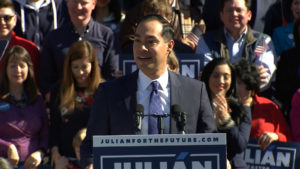
Julián Castro, whose campaign for the presidential nomination has so far struggled to gain much momentum, unveiled a proposal yesterday to create a national, federally funded prekindergarten program, eliminate tuition at public universities and community colleges and alter the student-debt repayment process, part of a sweeping policy plan that his campaign hopes could reshape public education.
Under the plan, borrowers would pay nothing until they earned at least 250 percent of the federal poverty level. The plan also includes investing $150 billion to update school facilities for pre-K through high school and imparting a federal tax credit that would increase teacher pay by up to $10,000 per year.
Castro is proposing paying for the plan, which his campaign estimates will cost upward of $1 trillion to implement, by repealing the Trump tax cuts and raising tax rates for corporations and high-income earners. “Chronic underinvestment in our schools, teachers and students over many decades and at all levels has allowed our competitors to leave us behind, and made an already unequal system more inequitable,” Mr. Castro wrote in announcing the plan.
The policy rollout is the second of Mr. Castro’s campaign, after his first proposal, on immigration, was released in April. Though he is the only presidential candidate with cabinet experience, under President Obama — and the only Latino candidate in the race — he has not yet managed to break through in national polls.
His campaign is hoping this proposal, and one on housing policy he plans to introduce next month, will help him stand out. Mr. Castro’s universal prekindergarten proposal, which would apply to 3- and 4-year-olds, echoes one he introduced as mayor of San Antonio, known as “Pre-K for S.A.,” which greatly expanded high-quality pre-K programs in the city and has been considered successful.

Recent Comments